Save ENO: The Chorus Speaks | reviews, news & interviews
Save ENO: The Chorus Speaks
Save ENO: The Chorus Speaks
Crucial and articulate voices representing a great company under threat
"Just listen". That's an imperative, of course, but it can be a very fair and reasonable one if the tone is right. It was Claudio Abbado's encouragement to his Lucerne Festival Orchestra players to make chamber music writ large. It also sounds persuasive and not at all militant coming from the mouths of ENO chorus members as their plea to the dramatic changes proposed by Chief Executive Officer Cressida Pollock, appointed a year ago.
So what's the main fault line in her solution to a company that's been in dire administrative – though rarely, whatever Arts Council England may have said, artistic – trouble for decades? Simply this: that it's morally wrong to ask a contracted chorus to sacrifice a nominal 25 per cent of their annual salary – in effect it works out around 40 per cent with the restriction on overtime and Sundays, leaving members with an average of £24,000 per annum – and three months' performances a year in the name of cuts at ENO.
The full season is work they're still passionate to fulfil, and they've never been in better shape to do so than under superlative new Music Director Mark Wigglesworth, adored, it seems, by all the company. His first three productions, of Shostakovich's Lady Macbeth of Mtsensk, Verdi's The Force of Destiny and a crucial revival of Mozart's The Magic Flute, have all seen the company on top form. Just as the company's stunning Mastersingers was a rebuke to the Arts Council blow this time last year, so the nominations for Olivier and International Opera Awards (chorus, orchestra and Wigglesworth) make the current proposal look very foolish indeed.
It wouldn't be quite so outlandish if every other alternative had been explored. Yet so many have been offered from singers, directors, conductors, actors, critics and others, not least in constructive comments on Save ENO's change.org petition, and none seems to have caught whatever imagination there might be in apparently closed minds.
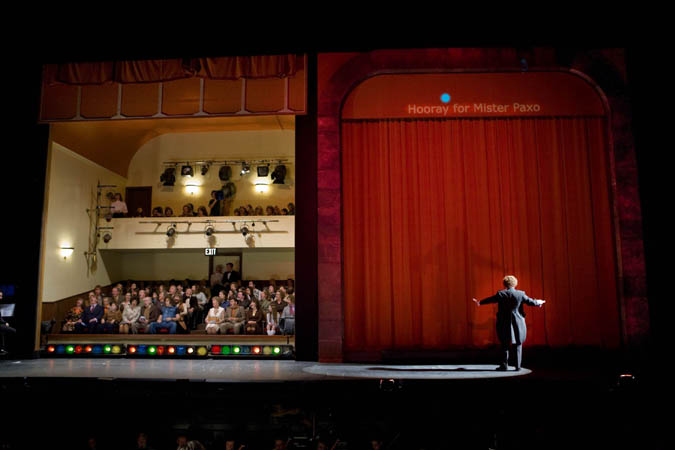 Statements have accumulated on the ENO website, as if in the company's name, which show Ms Pollock's refusal to take those alternatives on board and, worse, to perpetuate factual errors which have not been corrected when pointed out. I sent three emails to Ms Pollock, the second and third asking to meet her to provide a counterbalance to the arguments here, and finally received much the same argument (though no promise of a meeting) by way of an answer. In both that reply and the latest message on the ENO website, there is much spin, an unfair misrepresentation of the company artists' attitude to negotiation and a figure that is categorically wrong, stating the company's need to survive on an annual budget of £12.38 million. That's the Arts Council subsidy, not the entire figure, which is twice that amount. Not impressive maths for a McKinseyite from an accountancy firm. The error has not been corrected despite repeated requests.
Statements have accumulated on the ENO website, as if in the company's name, which show Ms Pollock's refusal to take those alternatives on board and, worse, to perpetuate factual errors which have not been corrected when pointed out. I sent three emails to Ms Pollock, the second and third asking to meet her to provide a counterbalance to the arguments here, and finally received much the same argument (though no promise of a meeting) by way of an answer. In both that reply and the latest message on the ENO website, there is much spin, an unfair misrepresentation of the company artists' attitude to negotiation and a figure that is categorically wrong, stating the company's need to survive on an annual budget of £12.38 million. That's the Arts Council subsidy, not the entire figure, which is twice that amount. Not impressive maths for a McKinseyite from an accountancy firm. The error has not been corrected despite repeated requests.
So to fight the good fight, those under attack need facts and clarity in a cause which is about the very survival of a treasured national company dedicated to performing opera in English at the very highest level (pictured above by Robert Workman: the ENO Chorus plays the audience in Richard Jones's production of Pagliacci). It seemed fair enough to ask some members of the chorus I met – who have to remain anonymous for contractual reasons – exactly how this whole horrible if not totally unfamiliar episode in ENO's beleaguered recent history began, and how it developed. I should add, just to give an idea of their heavy schedule, that they'd been rehearsing Akhnaten in the morning, were performing Norma in the evening, The Magic Flute the following evening and then the first night of Akhnaten. That's hard-working versatility for you.
"Shall we start from when we were given the proposals? Basically, there was no discussion with us, no consultation, no warning, we all knew something was coming and we waited with bated breath. Could it be redundancies, hours, overtime? Then the chorus were given a sheet of 10 proposals and every single item that you might have guessed was on that list. Our union organiser asked, what on this list are you really wanting and what can we talk about? And the response was, it has to be everything, if it's not everything it doesn't work. That's what we've reacted to."
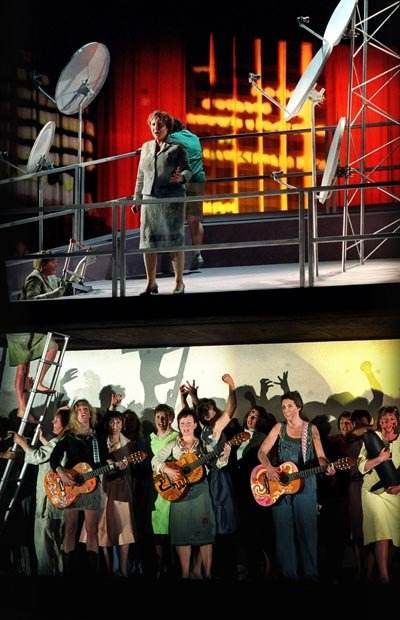 Were any of you in the chorus when the last cuts were made? "We all were. We've seen two sets of reductions. We were here in 2003 when the chorus were cut down from 68 to 50, which was the last time we resorted to industrial action. We sang the Verdi Requiem at St Paul's Covent Garden when we were supposed to be in the opening night of The Trojans (Susan Bickley and women of the ENO Chorus, pictured left by Laurie Lewis). That was actually resolved by voluntary redundancies. Then in 2007 we lost another six members, from 50 down to 44, and again they managed to do that through voluntary redundancies. Both times were unpleasant, but both times we were able to sit down and negotiate. This time there's been a very different tone to the whole process. Many will be forced to leave because they can't live in London on the reduced wage."
Were any of you in the chorus when the last cuts were made? "We all were. We've seen two sets of reductions. We were here in 2003 when the chorus were cut down from 68 to 50, which was the last time we resorted to industrial action. We sang the Verdi Requiem at St Paul's Covent Garden when we were supposed to be in the opening night of The Trojans (Susan Bickley and women of the ENO Chorus, pictured left by Laurie Lewis). That was actually resolved by voluntary redundancies. Then in 2007 we lost another six members, from 50 down to 44, and again they managed to do that through voluntary redundancies. Both times were unpleasant, but both times we were able to sit down and negotiate. This time there's been a very different tone to the whole process. Many will be forced to leave because they can't live in London on the reduced wage."
Let's be clear about the period in which you're supposed to find other work, from April to June. Rehearsals for summer operas will have started, and country house opera mostly wants students straight out of college who can accept a relatively low wage. "Absolutely, there's a small group who've been in the chorus for less than five years, but the majority have been in for 10, 20, one or two even 30 years, so the chances of going freelance again are fairly limited. We do concerts, they boost our salaries but they don't actually make for another career."
Do salaries increase with time - are the older members of the chorus on a higher rate and therefore more expensive? "No, it's a fixed rate. And the idea stated by Richard Morrison in The Times that there are lots of students who'd be very willing to fill the gap, that it won't be as polished but the show will go on: that makes you want to weep, it makes you literally despair."
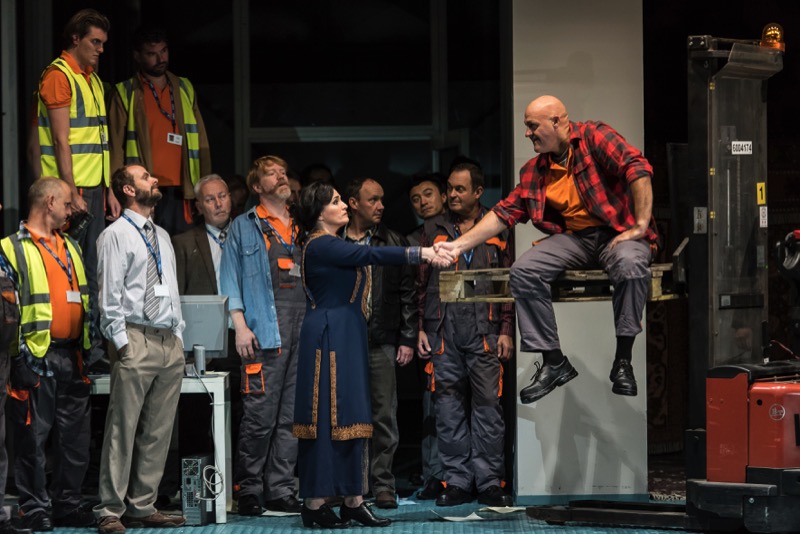 It's a big company with a chorus many of whose greatest successes have been in the major 20th century masterpieces, such as Peter Grimes and Lady Macbeth of Mtsensk (pictured right by Clive Barda, Patricia Racette and John Daszak with the Chorus). You can't really tour those pieces as has been suggested, and Welsh National Opera and Opera North already cover much of England. "To a very limited extent, you could take some of the smaller, well-rehearsed productions away. But we've been on tour twice in 20 years. We went over to Barcelona with The Fairy Queen in 2002 and Amsterdam with Death in Venice three years ago. It's terribly expensive.
It's a big company with a chorus many of whose greatest successes have been in the major 20th century masterpieces, such as Peter Grimes and Lady Macbeth of Mtsensk (pictured right by Clive Barda, Patricia Racette and John Daszak with the Chorus). You can't really tour those pieces as has been suggested, and Welsh National Opera and Opera North already cover much of England. "To a very limited extent, you could take some of the smaller, well-rehearsed productions away. But we've been on tour twice in 20 years. We went over to Barcelona with The Fairy Queen in 2002 and Amsterdam with Death in Venice three years ago. It's terribly expensive.
"So it's unlikely that the management will find us work as promised. It's depressing to be thinking that we're not going to be working for those three months. That then takes you into the whole artistic argument for a chorus that works and sings together all the time. That's what we're saying until we're blue in the face, but Cressida certainly doesn't understand that what the ENO Chorus has, and the sound we have, just doesn't happen overnight.
"She said when she came, I love this company, I love opera, and that's great. It was one of the first things we asked her when we got the proposals, do you think this opera chorus is a great chorus? And why do you think it's a great chorus, and what do you think makes an opera chorus world class? And all she talked about was the family, to which we replied, do you think these proposals will enable us to remain world class? And she said, I have to believe so. Why? Maybe I want to believe so – why have to? Because she can't stand up for her plans if she doesn't. Or she doesn't want to look at an alternative. That's why there's no discussion. It's truly depressing that the people running the company do not feel the burden of being responsible for this. There are lots of people standing by doing nothing.
We just feel a desperation that what is at stake is not being recognised
"What we have is built up from years and years of singing together, working together, so that directors know how we work, they can work quickly with us, and just the fact that we have a kind of sixth sense and we rely on each other's experience and professionalism, how we work together, to have this homogenous group. That is what's at stake. That is what is going to be destroyed with these plans. And how tragic that this might happen at a time when musical standards, under the inspirational leadership of Mark Wigglesworth, have never been higher.
"What will happen with such a severe paycut is that people will not be able to survive on this money, so they will leave, they may even leave the profession because there are not enough jobs, and the chorus will then be one where people just come for one or two years and then they can't afford to stay so they'll move on, and that will completely change the complexion of the whole chorus. And in a way the whole spirit and ethos of our company as an ensemble, that's how we work, and it will change, and we just feel a desperation that what is at stake is not being recognised.
"Once we worked out what these proposals would cost us and found we were below £25,000 a year before tax, we pointed this out to management and members of the board and asked if they realised how little they'd be leaving the choristers to live on, and quite clearly they didn't. So quite clearly the human side never came into this at all. Yet people outside really understand where we're coming from."
No civil servant would agree to work for a nine-month salary, surely? "Of course not, and I think people think, oh, but they're opera singers, well, we're just people who get up and go to work, and we're being cut in effect by 40 per cent, these are life-changing proposals."
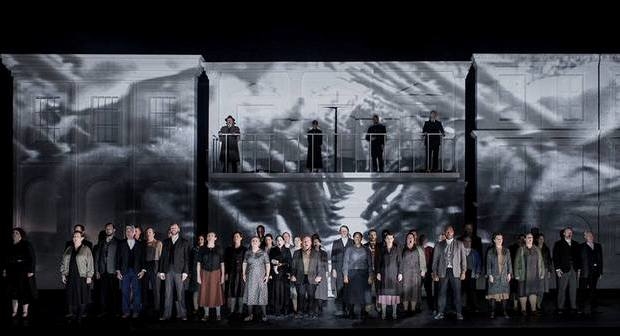 No-one from the company is on the Board, there's not a single orchestral musician, chorus member, member of the music staff – why is that? "We've been asking this for months and have never had a satisfactory answer. They keep promising they'll get people in who have an artistic bent, but it doesn't happen." (Postscript: the most recent addition is Louise Jeffreys, hugely experienced in world theatre, and what I hadn't realised is that she worked at ENO during the "Powerhouse" era. Thanks to Christopher Robson for pointing that out). Maybe the Board is really there to bring in money, but instead of vision you're getting reduction. "When you read through these proposals, the first thing that strikes you is that there's no artistic input, there's no-one who questions how this will affect the happiness and good running of an opera company, and nobody understands this. It's OK, we need to save this, that can go, and that's that done. (Pictured above by Robert Workman, a scene from the recent ENO production of The Force of Destiny)
No-one from the company is on the Board, there's not a single orchestral musician, chorus member, member of the music staff – why is that? "We've been asking this for months and have never had a satisfactory answer. They keep promising they'll get people in who have an artistic bent, but it doesn't happen." (Postscript: the most recent addition is Louise Jeffreys, hugely experienced in world theatre, and what I hadn't realised is that she worked at ENO during the "Powerhouse" era. Thanks to Christopher Robson for pointing that out). Maybe the Board is really there to bring in money, but instead of vision you're getting reduction. "When you read through these proposals, the first thing that strikes you is that there's no artistic input, there's no-one who questions how this will affect the happiness and good running of an opera company, and nobody understands this. It's OK, we need to save this, that can go, and that's that done. (Pictured above by Robert Workman, a scene from the recent ENO production of The Force of Destiny)
"It's lazy decision-making. If we thought this was the only way, we'd go, well, that's horrendous, but so be it, but we don't believe it's the only way. There must be other ways to investigate, to save money from other areas. It's tough to make any cuts, but make cuts from things that can be built back up quickly." But this can be gone with one stroke of the pen. "If you cut your core creative team, then that's it. You will never get them back.
I've been discussing with other "creatives" involved with ENO over the past year how much more could be done in terms of marketing, publicity, spelling out what ENO is. One chorus member points out how their fabulous-looking revival of Jonathan Miller's The Mikado (pictured below by Richard Hubert Smith, the director recently at the 200th performance with the company onstage) hasn't been used to sell the show.
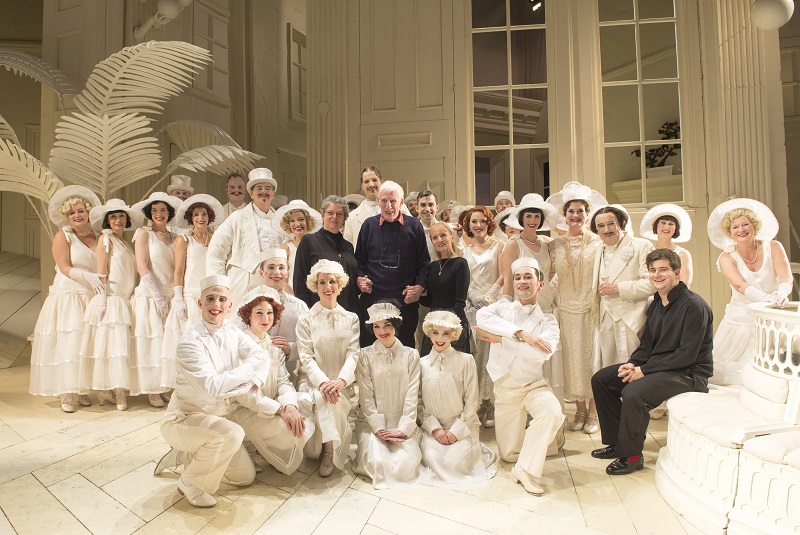 "When I first came to London and I was walking past the Coliseum, I'd never been in, I saw a poster of The Mikado set, and I walked straight in and bought a ticket, and of course it was so witty, it really set me off on coming to the Coliseum. Now, you think, what show is it that they're advertising, and if you can't even sell your product. There's an obsession with getting in your 20 and 30 year olds who are not really your opera-going people, to the detriment of the 55 year olds who really want to come, and they don't get the message out to them. And if children come too, then when they're 20 they'll remember what they saw when they were 12."
"When I first came to London and I was walking past the Coliseum, I'd never been in, I saw a poster of The Mikado set, and I walked straight in and bought a ticket, and of course it was so witty, it really set me off on coming to the Coliseum. Now, you think, what show is it that they're advertising, and if you can't even sell your product. There's an obsession with getting in your 20 and 30 year olds who are not really your opera-going people, to the detriment of the 55 year olds who really want to come, and they don't get the message out to them. And if children come too, then when they're 20 they'll remember what they saw when they were 12."
How is work coming on with education? "We'd like to talk more about it, we feel very strongly that if we do have gaps in our schedules, why not take members of the chorus out to schools to do outreach work? The Baylis Programme would love to work with us, but because of the crazy nature of our schedules in recent seasons, we just haven't been able to do that. Now that the space is potentially there you can plan up to 18 months in advance to work with specific schools on specific pieces. Let's make it part of what we do, because you've got a marvellous resource of 44 people. We can devise packages linking with opera, children can learn little bits, come and visit the costume and wig departments, learn about the company and its history. We have so many ideas of things that we could go out and do to benefit the wider community. You don't need to have us not working for three months."
A further example of the Chorus's creativity and its willingness not to sit idle has arisen with a volte-face over the annual musical (which, to be absolutely clear, has been fixed to take place over the Easter period when a ballet company would usually be coming in to the Coliseum).
"We can understand why we weren't involved in Sweeney Todd last year. It was set up at relatively short notice, and we were rehearsing Queen of Spades and Carmen, and some were involved in Between Worlds at the Barbican. We really can't understand why we're not involved in Sunset Boulevard. Originally the whole rehearsal schedule was in our schedules, and then in November we were told the Chorus will not be involved, and so at a stroke we're left with a huge gap in our schedule which doesn't look good at all, what are the ENO Chorus doing? Maybe it was because a West End director expected total involvement and we were doing shows in the evening already, so we couldn't be that available."
Obviously there has to be a team making these decisions, but ask! Talk!Is the company paying for another chorus? "That we don't know. Anyway, during the time we would have been doing Sunset Boulevard, our chorus master has arranged it that we give three concerts in April of the Brahms German Requiem in the London version, in English with two pianos – Mark [Wigglesworth] will be conducting. It's not a protest but a reaction to not being involved in Sunset. Then we go to Stratford for the big Shakespeare concert with Judi Dench. We're also talking about going out and doing more a cappella things to raise our profile."
Despite the constructive ideas about education work in the "missing" three months, though, the bottom line, surely, is still that you're fighting for a full opera season, 12 productions instead of nine.
"Absolutely, we still believe it would be possible to do that. Our management seems to think that opera necessarily has to cost a lot of money. But good art is not just about a lot of money. What we've experienced is that where people are reined in, they actually produce better work. Because they care about where every pound goes, and if a director is given a specific budget and has to stick to it, you can guarantee a better show. It's all about the people. As it is, they try things out, and things get thrown away, and you see a lot of wastage along the way, whereas if there are some things they can't risk, they can be more creative with their choices."
We know, for instance, how great Wagner's Ring can be with nothing but a bare stage and imaginative lighting. "That's it, and let's not look at that set-up as a negative [Later, Cressida Pollock's latest "open letter" is texted through before it goes on the ENO site, and it's negative about "black box productions"]. We have fabulous lighting people – you could make the same set look different. There are lots of interesting creative ideas that people could do, but our management seems to think that creative ideas equal airy-fairy, and actually none of us is a fool, we know that there are huge financial problems, but there are more imaginative solutions, it doesn't mean, oh we don't know anything, we're just arty people."
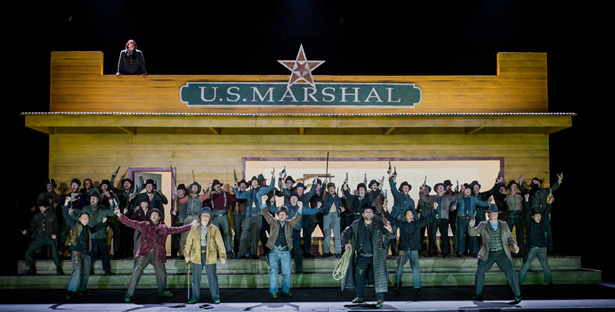
Creative input could change the whole outlook. "Listen, we had a company meeting last week and there was a woman from the front of house who sells programmes, and she said, you need to talk to your artists. She said, I sell programmes, I could tell you how to sell more programmes, but do you ask me? No! It was such a small point but it was so indicative of what was going on. Obviously there has to be a team making these decisions, but ask! Talk! The management keep saying they've asked directors, designers, singers, everybody outside the company, they've all given us their input, but they haven't asked anyone inside the company, that's all. And the other group of people who have not been consulted are the Friends of ENO – it's as if they want their money but not their ideas." (Pictured above by Robert Workman: scene from Act III of Richard Jones's ENO production of The Girl of the Golden West).
It's so much about morale and energetic optimism.
"Absolutely. Opening up instead of closing down. It changes everyone's atttude if you give people more responsibility, more input, they bloom, blossom, so the whole is greater. We want to be actively engaged in saving money. We realise it can't carry on the way it is. Five or six years ago the management came to the chorus and said, we need to save this much money, we're proposing this, but if you've got a better way...and we went away and spoke to various people and othe departments and we said because we've got rehearsal venues all over London, if you stop us travelling, a lot of our time is spent on the tube, so if you make us spend two sessions in one location rather than a morning spent in one location then lunchtime spent travelling to another, you save many thousands of pounds, and they had the good grace to say yes you're right, we hadn't thought of that, and we felt consulted, involved, it was done in the right way. They saved tens of thousands of pounds, not on this scale, but just the sheer fact that they came to us and said we have this idea, but do you have a better one, and we said yes we have.
"All we hear said to us is 'there is no other way'. They seem to be terrified to consider that there might be an alternative business plan that would make real savings whilst enabling the company to continue on a full time basis." Read the comments by performers, directors and writers on the petition, and you will see various forms of that alternative plan constructively proposed.
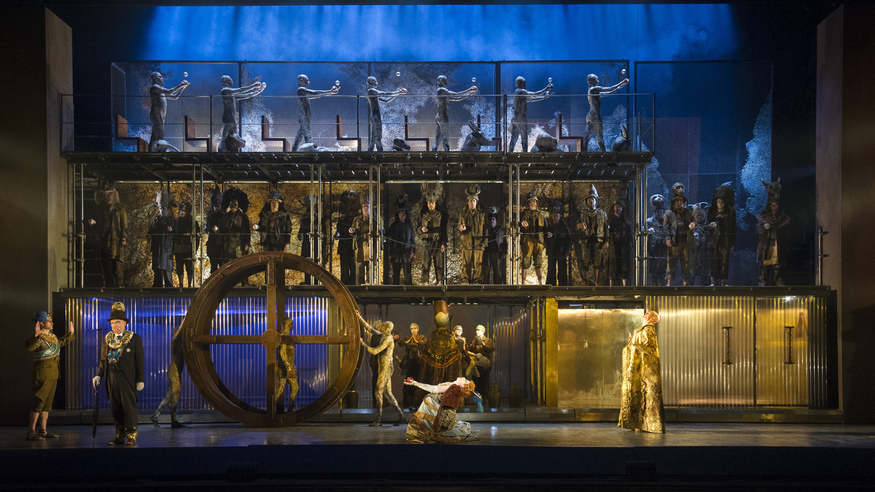
So what next, now that the proposed last-night strike in Act One of the company's acclaimed production of Akhnaten (pictured above by Richard Hubert Smith) is off, pending further negotiations? Since I spoke to the singers, the chorus visited Parliament at the invitation of the Performers Alliance All Party Parliamentary Group. After knocking the assembled MPs for six once again with Gilbert and Sullivan's "Hail, Poetry!", a speech was made highlighting the importance of continued dialogue between ACE – whose role still remains somewhat ambiguous – and the ENO Board. Read the full text of the speech here. Following the meeting, a letter was sent by the group to the Culture Secretary and the Arts Council CEO urging a negotiated settlement.
The bottom line remains that the plans as they stand would be a catastrophic mistake both culturally and artistically for English National Opera. The decision must be made in alliance with a strong and visionary artistic team. The only figure who has that artistic vision at the moment, and in spades, is Wigglesworth, a Music Director outstanding not just in the eyes of the public but also as far as every member of the company I've spoken to is concerned. A big question-mark hangs over the soon-to-be-appointed Artistic Director, who needs not only to be involved in crucial decisions which will affect the entire future and direction of ENO, but also to be given the upper hand in those decisions. The current company hierarchy does not seem to allow for that, which would be yet another huge mistake.
STOP PRESS (18/3) A deal has been reached, but it's far from ideal, not least because the company will still be part-time with no operas performed between March and June. Details here.
- Full details of the three Brahms German Requiem performances in April and how to book
- Read David Nice's recent thoughts about the ENO situation on his blog
Below: watch the ENO Chorus singing Sullivan's 'Hail, Poetry!' outside the ACE offices
Share this article
The future of Arts Journalism
You can stop theartsdesk.com closing!
We urgently need financing to survive. Our fundraising drive has thus far raised £49,000 but we need to reach £100,000 or we will be forced to close. Please contribute here: https://gofund.me/c3f6033d
And if you can forward this information to anyone who might assist, we’d be grateful.

Subscribe to theartsdesk.com
Thank you for continuing to read our work on theartsdesk.com. For unlimited access to every article in its entirety, including our archive of more than 15,000 pieces, we're asking for £5 per month or £40 per year. We feel it's a very good deal, and hope you do too.
To take a subscription now simply click here.
And if you're looking for that extra gift for a friend or family member, why not treat them to a theartsdesk.com gift subscription?
more Opera
 La bohème, Opera North review - still young at 32
Love and separation, ecstasy and heartbreak, in masterfully updated Puccini
La bohème, Opera North review - still young at 32
Love and separation, ecstasy and heartbreak, in masterfully updated Puccini
 Albert Herring, English National Opera review - a great comedy with depths fully realised
Britten’s delight was never made for the Coliseum, but it works on its first outing there
Albert Herring, English National Opera review - a great comedy with depths fully realised
Britten’s delight was never made for the Coliseum, but it works on its first outing there
 Carmen, English National Opera review - not quite dangerous
Hopes for Niamh O’Sullivan only partly fulfilled, though much good singing throughout
Carmen, English National Opera review - not quite dangerous
Hopes for Niamh O’Sullivan only partly fulfilled, though much good singing throughout
 Giustino, Linbury Theatre review - a stylish account of a slight opera
Gods, mortals and monsters do battle in Handel's charming drama
Giustino, Linbury Theatre review - a stylish account of a slight opera
Gods, mortals and monsters do battle in Handel's charming drama
 Susanna, Opera North review - hybrid staging of a Handel oratorio
Dance and signing complement outstanding singing in a story of virtue rewarded
Susanna, Opera North review - hybrid staging of a Handel oratorio
Dance and signing complement outstanding singing in a story of virtue rewarded
 Ariodante, Opéra Garnier, Paris review - a blast of Baroque beauty
A near-perfect night at the opera
Ariodante, Opéra Garnier, Paris review - a blast of Baroque beauty
A near-perfect night at the opera
 Cinderella/La Cenerentola, English National Opera review - the truth behind the tinsel
Appealing performances cut through hyperactive stagecraft
Cinderella/La Cenerentola, English National Opera review - the truth behind the tinsel
Appealing performances cut through hyperactive stagecraft
 Tosca, Royal Opera review - Ailyn Pérez steps in as the most vivid of divas
Jakub Hrůša’s multicoloured Puccini last night found a soprano to match
Tosca, Royal Opera review - Ailyn Pérez steps in as the most vivid of divas
Jakub Hrůša’s multicoloured Puccini last night found a soprano to match
 Tosca, Welsh National Opera review - a great company reduced to brilliance
The old warhorse made special by the basics
Tosca, Welsh National Opera review - a great company reduced to brilliance
The old warhorse made special by the basics
 BBC Proms: The Marriage of Figaro, Glyndebourne Festival review - merriment and menace
Strong Proms transfer for a robust and affecting show
BBC Proms: The Marriage of Figaro, Glyndebourne Festival review - merriment and menace
Strong Proms transfer for a robust and affecting show
 BBC Proms: Suor Angelica, LSO, Pappano review - earthly passion, heavenly grief
A Sister to remember blesses Puccini's convent tragedy
BBC Proms: Suor Angelica, LSO, Pappano review - earthly passion, heavenly grief
A Sister to remember blesses Puccini's convent tragedy
 Orpheus and Eurydice, Opera Queensland/SCO, Edinburgh International Festival 2025 review - dazzling, but distracting
Eye-popping acrobatics don’t always assist in Gluck’s quest for operatic truth
Orpheus and Eurydice, Opera Queensland/SCO, Edinburgh International Festival 2025 review - dazzling, but distracting
Eye-popping acrobatics don’t always assist in Gluck’s quest for operatic truth

Add comment